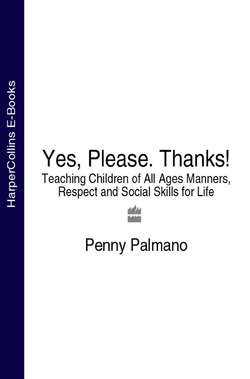Читать книгу Yes, Please. Thanks!: Teaching Children of All Ages Manners, Respect and Social Skills for Life - Penny Palmano - Страница 12
Оглавлениеthree
Love
How to Show Love
Our children need to feel and know that they are loved, with that unconditional love that only we, their parents, can give them which is not tied to the way they behave or perform and cannot be withdrawn as a means of manipulation. Love needs to be shown in different ways, by physical affection, by showing respect and acceptance, and by the way we care for and nurture our children.
From day one, babies physically and mentally need bodily contact to bond with their parents. And it’s not just as babies that your children need to be cuddled, but all through their developing years to adulthood. Even adults enjoy a hug with their parents. Children need the reassurance that physical contact in the form of kisses and cuddles, a stroke of the cheek, or an arm around a shoulder can provide. We should reinforce how we feel by actually telling them that they are loved.
Far too many parents neglect, unintentionally, to demonstrate enough physical contact to their children as they grow up. And whilst a 14-year-old may dislike showing any physical emotion towards their parents in front of their friends, they will be just as happy to have a hug with their mother or father when they get home.
Parents who had a loving childhood may find it easier to show love than parents who were deprived of physical love as children, so some parents have to make more effort to be physical, but it is absolutely essential that children never have to question their parents’ love for them.
Young children enjoy seeing their parents showing affection to each other; it’s just as they get older that they get horribly embarrassed.
Love must also be shown by guiding and educating your children so that they can function happily in their environment. It must never be confused with putting your hand in your pocket.
There are two ways of showing love – one is the cuddly love of hugs and kisses and the other is the equally important one of teaching your child how to behave.
Little Things Mean a Lot
Apart from the usual ways in which we can show our love for our children, they also appreciate little kind, thoughtful gestures, just as we like our partners to do for us. For instance, if they have a test at school, let them know you are thinking of them by sending a good-luck text with an encouraging message, ‘Thinking of you. Go show ’em. You can do it. Luv u, Mum.’ If you know that they’re a bit low because they didn’t make the football team or get the part in the school play they wanted, surprise them with their favourite treat to help cheer them up. Or once they’ve left for school you discover they have left an important piece of school-work at home, make the effort to take it to the school. Don’t just think, ‘Oh they’re always forgetting things, this’ll teach them,’ or turn up at the school and give your child a lecture on getting organized before you hand the work over. Be loving, be kind. They will learn to be more organized. When you see the look of relief on their faces, simply say with a smile, ‘It’s a good job I love you so much.’
Sometimes you could just give your children a big hug and tell them you just couldn’t resist doing it because they are so gorgeous. Wouldn’t we all love it if our partners (still/ever) did that? But perhaps if we did it to them, they might!
